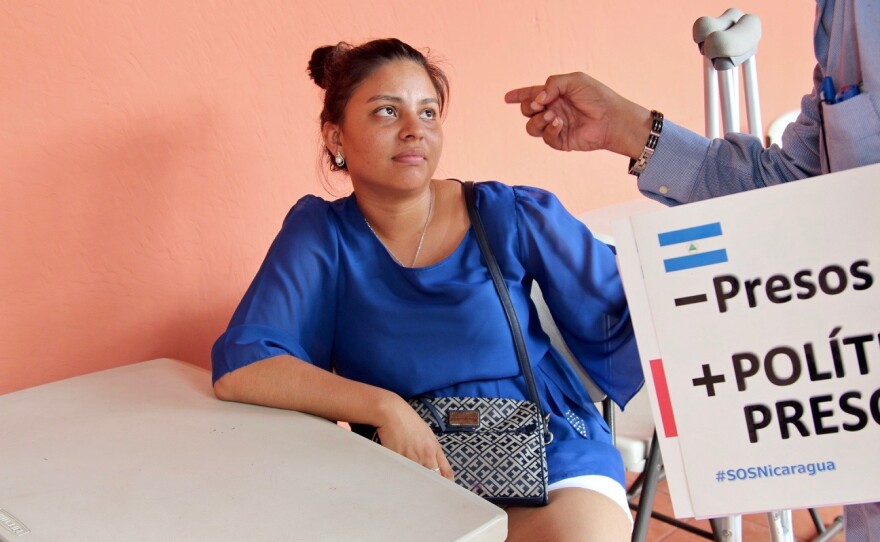The United States is threatening sanctions against Nicaragua in response to alleged electoral fraud and human rights abuses. More than 300 people have been killed since April. Hundreds of others, many of them college students, are in jail. The chaos is triggering large-scale flight with human rights workers in Nicaragua’s capital of Managua saying that at least a thousand Nicaraguans are either applying or planning to apply to come legally to the U.S.
The people often chant "Democracy Yes, Dictatorship No!" in scenes replayed across Nicaragua. Unarmed anti-government protests over corruption and repression have repeatedly been met by police violence. The international community has condemned Nicaragua but the cycle continues.
Today, the death toll stands at more than 300. The UN and governments from Europe to the Americas blame the regime of President Daniel Ortega. Ortega’s police are now hunting for dissidents, especially students who initially triggered the protest movement.
One of them is 19-year-old Elsa Valle.
“We were intimidated every day and it continues now,” she said.
In June, Valle was giving food and medicine to students when police burst in. She said officers threatened torture and death as they drove her to a notorious jail known as El Chipote. Human rights defenders say torture is commonplace there. Valle says she was brought into a room where there were men armed with machine guns. She said they ordered her to admit the students had received arms to fight the government.
“I couldn't do that because it's not true,” she said. After that interrogation Valle said a guard threatened her. ‘‘I am going to rape you," Valle alleged the guard said. She said she was also forced to sleep naked at times. At night, she says guards clicked AK-47s outside her cell.
“There was a lot of psychological abuse in there,” Valle said.
Valle was pregnant when she was detained. She suffered a miscarriage in jail. She was released in September without explanation. She said her boyfriend was shot dead by paramilitaries days before she was arrested. Her father is still in jail, taken in after being at a march.
Terror is not confined to jail. Thousands of people, many armed with machetes, have been dispatched by Ortega’s government to take over lands owned by the regime’s opponents. Close to 17,000 acres of Nicaraguan farmland are under armed occupation.
"The whole world has seen what happened here, how human rights are violated day-to-day,” said Michael Healy, head of Nicaragua's Union of Agricultural Producers.
Between farmers, ranchers, their workers and families, Healy’s union represents roughly one in three Nicaraguans. He said armed squatters are just one footnote to a mosaic of state repression.
"Unfortunately, we’ve been tied up,” Healy said. “And we have to break those chains."
U.S. sanctions are looming, shaped in large measure by two people otherwise at opposite ends of the political spectrum, Texas Republican Senator Ted Cruz and Vermont Democratic Senator Patrick Leahy. The sanctions would hurt a fragile economy that’s been declining since April. However, Healy welcomed the prospect of sanctions.
"If we want to get rid of the regime, we have to pay a little price, we Nicaraguans."
At his rallies, President Ortega blames the crisis on the U.S. He does not offer evidence. The anti-U.S. words resonate in a country with a long and often difficult relationship with the U.S. The U.S. backed a dynastic dictatorship and when that dictatorship was defeated militarily, the U.S. financed the Contras, a counter-revolutionary and often violent group that tried unsuccessfully to dislodge the Sandinistas from power. Ortega tells his audiences, which reportedly include government workers ordered to attend his public events, that Washington should not get involved.
As for Elsa Valle, the student who suffered through three months in jail, the repression hasn’t ended. Elsa and her 17-year-old sister, Rebeca, were arrested Nov. 13. They were standing outside Managua’s Central Court House as their father, Carlos, made an appearance before a Sandinista judge. After an hour, the pair was released. Both say they were hit by police officers. However, Elsa Valle said she won’t be intimidated.
"I've lost my fear after everything they've done,” she said. She added that for all those fleeing Nicaragua, she and many more are remaining in place and who will continue their struggle.





